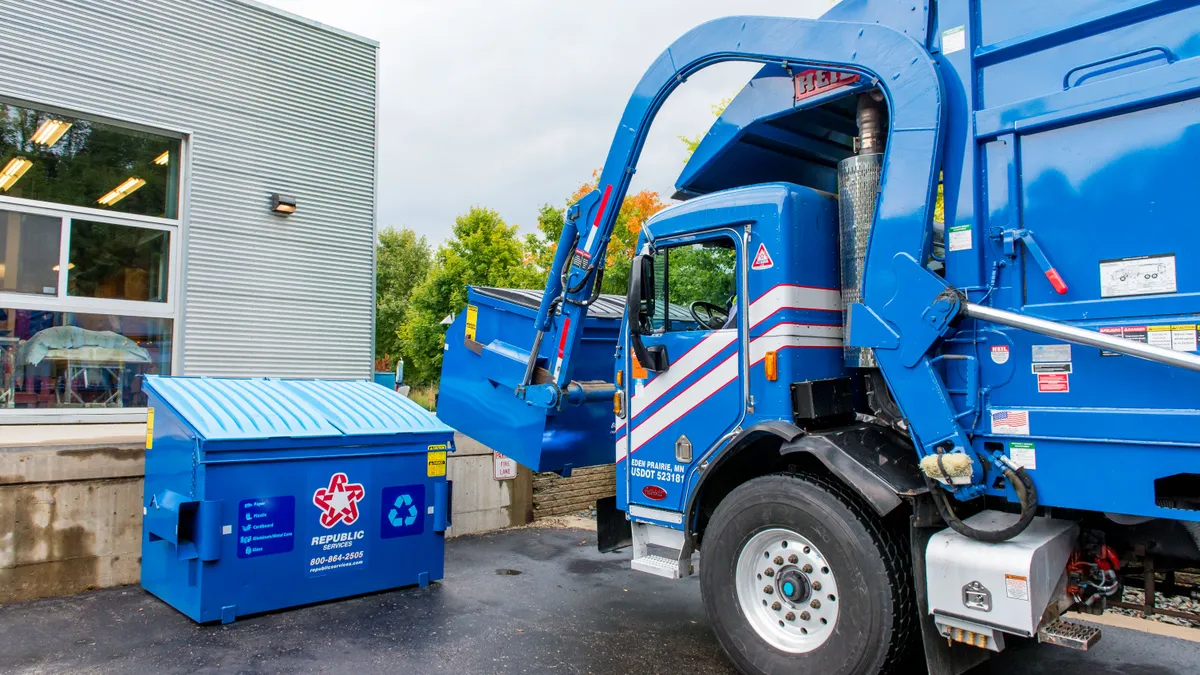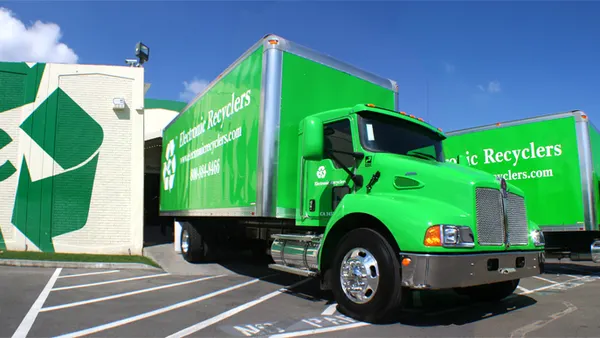Dive Brief:
- Republic Services plans to hire an independent firm to conduct a civil rights audit, more than four months after shareholders voted down a similar proposal from the International Brotherhood of Teamsters.
- In a statement posted on its website, Republic said the “outside perspective” gained from the audit will help the company strengthen its current diversity and equity programs while identifying areas of improvement. It did not give a timeline or name who would conduct the audit. Republic declined to comment further other than to say more information would be coming.
- Republic says the audit is part of its ongoing efforts to improve environmental and racial justice transparency. The company recently received a low ranking in a racial justice scorecard released by As You Sow, an environmental and social corporate responsibility nonprofit. Republic disputes the ranking.
Dive Insight:
The announcement comes as certain waste and recycling companies continue to face pressure to be more transparent about environmental and racial justice issues, particularly since the 2020 police murder of George Floyd. Civil rights audits have become a more common investor strategy in recent years to examine how major companies treat employees and view their overall DEI strategies. Companies like Amazon, Apple, Starbucks and Meta have all agreed to similar audits.
The International Brotherhood of Teamsters submitted shareholder proposals this spring calling for Republic Services, along with WM and Stericycle, to conduct independent civil rights audits of their operations. Separately, Parnassus Funds, an ESG mutual fund investment firm, called for Republic to undergo a separate environmental justice audit.
Those shareholder proposals passed at WM and Stericycle, but the proposals at Republic failed.
The Teamsters and Parnassus said an independent auditing process is necessary to get an unbiased picture of how the companies handle hiring and promotion diversity, employee safety and their environmental impact on surrounding communities. The waste companies say they already provide much of this data.
A Republic spokesperson said the decision to go ahead with the audit despite the vote is “part of our continuing focus on maintaining a highly inclusive and diverse culture” and said it will help the company advance its environmental justice efforts. Representatives from Teamsters and Parnassus did not respond to requests for comment as of press time.
In the shareholder proposals, Teamsters and Parnassus asked for civil rights organizations, employees and customers to be among those who can weigh in on the audit process. Teamsters also asked for Republic to provide detailed data that could show how effective the company’s current DEI initiatives are in promoting and protecting its employees of color. It’s unclear whether Republic’s audit will include such an input process or specific DEI data.
Independent groups such as As You Sow also have been measuring waste companies’ corporate racial justice actions. AYS puts together its annual racial justice scorecard by assessing publicly available data on racial justice and workplace equity for public companies.
Olivia Knight, AYS’ racial justice initiative manager, said the scorecard now includes new metrics that track corporate progress on environmental justice. That includes environmental violations, fines and general business practices and public acknowledgment of environmental justice. This year’s rankings are based on the Russell 1000 instead of the S&P 500, which it used in previous scorecards.
This year, Republic scored in the bottom 10 — 1004 out of 1013 companies — for racial justice metrics. Republic’s low score is due, in part, to AYS categorizing it as having more than $10 million in “environmental fines” since 2015 and more than 25 environmental violations since 2015. The rankings do not specify which fines and violations were included in the score. The AYS data also docks points for companies not having a public-facing racial justice statement, not publicly disclosing certain DEI hiring metrics or not conducting other community racial justice initiatives, according to the available data.
A Republic spokesperson disputed the ranking, saying the score did not accurately reflect the company’s environmental justice efforts or include key data, such as its EEO-1 report.
“As You Sow failed to acknowledge many of our publicly available disclosures, including an environmental justice analysis, our EEO-1 statement and our participation in the CEO Action for Diversity & Inclusion pledge,” the spokesperson said in an email.
As You Sow did not comment directly on Republic’s statement. The group said its research team reviews the Russell 1000 and reaches out to companies with their scores once a year, and it updates the database once a quarter with any new information. The current scorecard says it reflects data as of June 30.
Meanwhile, WM ranked in the middle of the pack on AYS’ racial justice scorecard at 478th, while Clean Harbors ranked 993rd. WM, in a statement, said it continues to “assess our goals and initiatives to make improvements in future years,” particularly around racial injustice. Clean Harbors did not respond to requests for comment.











